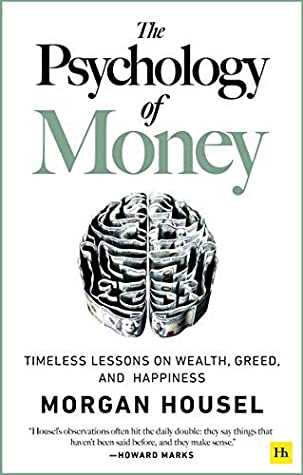Book – The Psychology of Money (Summary)
Author – Morgan Housel
Genre – Self-help Book
Published in – 2020
We all Know mathematical facts about Money, but the problem is that knowing what to do tells you nothing about what happens in your head when you try to do it.
The psychology of money talks about what goes on in our heads when we read and apply what we learn about Money, which is way more important. We are not as rational as we like to think when it comes to Money.
Morgan believes that we think about and are taught about Money in ways that are too much like physics (with rules and laws) and not enough like psychology (with emotions and nuance).
To grasp why people bury themselves in debt, you don’t need to study interest rates; you need to check the history of greed, insecurity, and optimism, and that’s what The Psychology of Money discusses and teaches valuable money lessons.

About the Author –
Morgan Housel is a partner at Collaborative Fund and a former columnist at The Motley Fool and The Wall Street Journal. He has also written other books 50 years in the making, and everyone believes it.
About the Book –
The Psychology of Money is less about the technical aspect of Money and more about how we make decisions when it comes to Money, which has less to do with facts, numbers, and logic.
The premise of this book is that doing well with Money has little to do with how smart you are and a lot to do with how you behave. And behavior is hard to teach, even to brilliant people.
The Psychology of Money is a detailed version of a 20-point report Morgan published in 2018 about essential flaws, biases, and causes of deviant behavior he has seen affect people when dealing with Money.
A few Key Points From The Book
1) No One’s Crazy –

- They say we are best judges of other’s actions and lawyers of our own. We judge people based on how we perceive things. And what looks extravaganza to some may look normal to others.
- We go through life with different beliefs, goals, and forecasts than others. That’s not because one of us is brighter than the other or has better information. We’ve had different lives shaped by diverse and equally persuasive experiences.
- Every decision people make with Money is justified by taking the information they have at the moment and plugging it into their unique mental model of how the world works.
2) Never Enough –
Unless you know what is enough, you’ll never have enough. This is very personal, and you should take your own time to decide what is enough for you. Please note that it’s your life, and you don’t want others to tell you what is enough.
You may consider a couple of points while working on what is enough.
- Don’t let the goalpost move as soon as you reach there.
- Social comparison is a problem – Don’t set your goal to be better than anyone else.
- Enough is not too little – we often mistake enough for too little. However, enough means you are comfortable with others judging the way they want.
- More valuable things like family, friends, reputation, Freedom, and happiness exist. It’s not worth risking these, no matter what we gain.
3) Getting Wealthy vs. Staying Wealthy –
- Getting Money is one thing. Keeping it is another. Most of us who have worked for a while can resonate with this, especially if you have increasing consumer debt with the income increase.
- Getting Money requires taking risks, being optimistic, and putting yourself out there.
- But keeping Money requires the opposite of taking a risk. It requires frugality and an acceptance that at least some of what you’ve made is attributable to luck, so past success can’t be relied upon to repeat indefinitely.
4) Tails You Win –
- We underestimate how normal it is for many things to fail, which causes us to overreact when they do. What seems like overnight success has had many causes and effects in creating overnight success.
- Finance is no different, be it venture capitalization, mutual funds, other investments, and non-finance matters. Most of the projects fail, and few that succeed make up for all losses and make enormous fortunes.
- Don’t wait for hacks and tricks. Every big success is the tail of a lot of failed attempts. That’s where we learn to make good decisions and recognize opportunities.
- Warren Buffett has been quoted many times in the book. He had around 400 to 500 stocks in his lifetime and made most of his money from 10 of them. That’s the tail effect.
5) Freedom –

This is my favorite point from the book.
The ideas explained the level of Freedom –
- A small wealth can enable you to take a break from work when you are sick without breaking the bank.
- A bit more means waiting for an excellent job when you get laid off. This can be life-changing.
- Six months’ expense in saving accounts means not being terrified of your boss, as you won’t be ruined if you lose your job and get time to find a better workplace. This can be liberating and can save tons of stress and anxiety.
- Then there’s retirement when you want to, rather than when you need to.
Loved these two lines from the book on Freedom –
- Using your Money to buy time and options has a lifestyle benefit few luxury goods can compete with.
- Doing something you love on a schedule you can’t control can feel the same as doing something you hate.
6) Save Money –

- This one has been drummed in our ears since we started earning, yet few can save. Whoever saves also has some goal in mind for keeping, like putting a down payment for a house, car ch, child education, marriage, etc.
- Morgan offers a different viewpoint (Don’t wait for any reason to save) and convinces with amazing simplicity to keep for the sake of saving. Only saving for a specific goal makes sense in a predictable world. But ours isn’t.
- You can build wealth without a high income, but we cannot create wealth without a high savings rate.
Consider the three points below when you think of saving –
- Savings can be created by spending less.
- You can spend less if you desire less.
- And you will desire less if you care less about what others think of you.
Benefits of savings without specific Reason –
- Saving is a hedge against life’s inevitable ability to surprise you at the worst possible moment.
- Savings without a spending goal gives you options and flexibility, the ability to wait, and the opportunity to pounce.
- It gives you time to think. It lets you change course on your terms.
- The flexibility and control over your time is an unseen return on wealth.
7) Few Lines for Starting or Boost Saving Money –
Morgan summarizes a couple of general rules to handle Money, and it applies no matter what your goals –
- Less ego, more wealth. Saving Money is the gap between your ego and your income; wealth is what you don’t see.
- No matter how much you earn, you will never build wealth unless you can put a lid on how much fun you can have with your Money today.
- If you want to do better as an investor, the most powerful thing you can do is increase your time horizon.
- Time is the most powerful force in investing. It makes little things grow big, and big mistakes fade away.
- Use Money to gain control over your time because not having power is such a powerful and universal drag on happiness.
- Respect the mess. Intelligent, informed, and reasonable people can disagree in finance because people have vastly different goals and desires. There are no single correct answers, just the answer that works for you.
I have also created a video of a few quotes from the book – I hope you like it. Please subscribe to my YouTube channel – Myread4change.
Conclusion –
This is the best book I have read on Money so far. It helped me understand why I behave like I do with Money and get better at it.
I highly recommend this book to everyone who knows money rules yet is not improving.
You may consider following Morgan Housel’s work on his Website.
If you like this book, you may also like Mind Over Money.
Thank you for reading.
Muzammil


Everything is very open with a precise explanation of the challenges. It was definitely informative. Your website is very helpful. Thank you for sharing!
Next time I read a blog, Hopefully it doesn’t disappoint me just as much as this particular one. I mean, I know it was my choice to read, however I actually thought you would probably have something helpful to say. All I hear is a bunch of whining about something that you could possibly fix if you were not too busy looking for attention.
This is the perfect site for everyone who wants to understand this topic. You realize so much it’s almost tough to argue with you (not that I personally will need to… Ha). You certainly put a fresh spin on a topic that has been written about for years. Excellent stuff, just great!
This is a really good tip especially to those fresh to the blogosphere. Short but very precise information… Many thanks for sharing this one. A must read article!
Hi my loved one! I wish to say that this article is amazing, great written and come with approximately all vital infos. I’d like to see extra posts like this.
This is the right web site for anyone who wishes to find out about this topic. You understand so much its almost tough to argue with you (not that I really would want to…HaHa). You definitely put a fresh spin on a subject which has been written about for many years. Excellent stuff, just great!
Good web site you have got here.. It’s difficult to find high quality writing like yours these days. I really appreciate individuals like you! Take care!!
An impressive share! I have just forwarded this onto a colleague who had been conducting a little homework on this. And he in fact ordered me dinner because I stumbled upon it for him… lol. So let me reword this…. Thanks for the meal!! But yeah, thanks for spending some time to talk about this subject here on your site.
Hi there! Do you know if they make any plugins to protect against hackers? I’m kinda paranoid about losing everything I’ve worked hard on. Any recommendations?
You are a very smart person!
Some really nice and utilitarian info on this web site, too I conceive the style holds excellent features.
You really make it seem so easy with your presentation but I find this matter to be really something which I think I would never understand. It seems too complicated and extremely broad for me. I am looking forward for your next post, I will try to get the hang of it!
This discovery could explain the difference between thin people, who can eat anything without gaining a gram, and others who gain weight from the smallest food particles
When in doubts, travel. If you still have doubts and need an extra push, this list of amazing adventure quotes will help you get over them
I’m extremely impressed with your writing skills and also with the layout on your blog. Is this a paid theme or did you modify it yourself? Either way keep up the nice quality writing, it is rare to see a great blog like this one today..
Your blog is a true fantastic. Your consistent delivery of high-quality content is truly commendable. Thank you for consistently going above and beyond in providing valuable insights. Keep it up.
Incredible! This blog looks exactly like my old one! It’s on a completely different subject but it has pretty much the same layout and design. Excellent choice of colors!
Usually I do not read post on blogs, but I would like to say that this write-up very forced me to try and do it! Your writing style has been amazed me. Thanks, quite nice post.
Hey there just wanted to give you a quick heads up and let you know a few of the images aren’t loading correctly. I’m not sure why but I think its a linking issue. I’ve tried it in two different internet browsers and both show the same outcome.
Excellent blog you have here but I was wanting to know if you knew of any forums that cover the same topics discussed here? I’d really love to be a part of group where I can get feedback from other knowledgeable people that share the same interest. If you have any recommendations, please let me know. Thanks!
Hey, you used to write great, but the last few posts have been kinda boring? I miss your great writings. Past few posts are just a bit out of track! come on!
Howdy! I’m at work browsing your blog from my new iPhone! Just wanted to say I love reading through your blog and look forward to all your posts! Carry on the superb work!
Hi! Would you mind if I share your blog with my facebook group? There’s a lot of people that I think would really enjoy your content. Please let me know. Thanks
This really answered my drawback, thank you!
I don’t even know how I ended up here, but I thought this post was great. I do not know who you are but certainly you’re going to a famous blogger if you are not already 😉 Cheers!
Excellent website you have here but I was wanting to know if you knew of any forums that cover the same topics talked about here? I’d really like to be a part of group where I can get opinions from other knowledgeable people that share the same interest. If you have any recommendations, please let me know. Thanks a lot!
You can definitely see your skills within the paintings you write. The sector hopes for more passionate writers such as you who aren’t afraid to say how they believe. All the time go after your heart.
I do believe all of the ideas you’ve introduced on your post. They are very convincing and can definitely work. Nonetheless, the posts are too brief for novices. Could you please prolong them a little from next time? Thanks for the post.
This really answered my downside, thanks!
Thank you, I’ve been searching for details about this subject for ages and yours is the best I’ve discovered so far.
I think this is one of the most vital info for me. And i’m glad reading your article. But wanna remark on few general things, The web site style is ideal, the articles is really great : D. Good job, cheers
Thank you for the good writeup. It in fact was a amusement account it. Look advanced to far added agreeable from you! By the way, how could we communicate?
very good submit, i actually love this web site, keep on it
I will right away grab your rss as I can’t find your e-mail subscription link or e-newsletter service. Do you have any? Please let me know so that I could subscribe. Thanks.
Thanks for giving your ideas. A very important factor is that college students have a choice between federal government student loan and a private education loan where its easier to select student loan debt consolidation than with the federal student loan.
Bookmark your weblog and check again here regularly. I’m quite certain I’ll learn plenty of new stuff right here! Best of luck for the next!
I know this if off topic but I’m looking into starting my own weblog and was curious what all is required to get set up? I’m assuming having a blog like yours would cost a pretty penny? I’m not very internet savvy so I’m not 100 sure. Any tips or advice would be greatly appreciated. Thanks
Howdy! I’m at work surfing around your blog from my new apple iphone! Just wanted to say I love reading your blog and look forward to all your posts! Keep up the fantastic work!
You actually make it seem so easy with your presentation but I find this topic to be really something which I think I would never understand. It seems too complicated and extremely broad for me. I’m looking forward for your next post, I?ll try to get the hang of it!
Write more, thats all I have to say. Literally, it seems as though you relied on the video to make your point. You clearly know what youre talking about, why throw away your intelligence on just posting videos to your site when you could be giving us something informative to read?
Terrific post however , I was wanting to know if you could write a little more on this topic? I’d be very thankful if you could elaborate a little bit further. Bless you!
There is noticeably a bundle to know about this. I assume you made sure good factors in options also.
You need to take part in a contest for among the best blogs on the web. I will advocate this web site!
What?s Happening i’m new to this, I stumbled upon this I have found It positively useful and it has helped me out loads. I hope to contribute & assist other users like its aided me. Good job.
Remarkable things here. I am very glad to see your post. Thanks a lot and I’m looking forward to contact you. Will you please drop me a e-mail?
Hi, Neat post. There’s an issue along with your site in web explorer, may test this? IE nonetheless is the marketplace chief and a big part of other folks will leave out your wonderful writing because of this problem.
This article is absolutely incredible! The author has done a tremendous job of presenting the information in an engaging and educational manner. I can’t thank him enough for offering such priceless insights that have certainly enhanced my awareness in this subject area. Hats off to her for crafting such a gem!
You can certainly see your enthusiasm in the work you write. The world hopes for more passionate writers like you who are not afraid to say how they believe. Always follow your heart.
Hello there, You have done an excellent job. I will definitely digg it and personally suggest to my friends. I am confident they will be benefited from this website.
Thanks a lot : ) for your post. I’d prefer to comment that the tariff of car insurance varies from one policy to another, given that there are so many different issues which bring about the overall cost. As an example, the model and make of the car or truck will have a massive bearing on the price. A reliable aged family car will have a less expensive premium than just a flashy performance car.
Hello! I just would like to give a huge thumbs up for the great info you have here on this post. I will be coming back to your blog for more soon.
My brother suggested I might like this web site. He was entirely right. This post truly made my day. You can not consider just how so much time I had spent for this info! Thanks!
Fantastic beat ! I would like to apprentice while you amend your website, how can i subscribe for a blog site? The account aided me a acceptable deal. I had been a little bit acquainted of this your broadcast offered bright clear concept
I truly appreciate this post. I have been looking everywhere for this! Thank goodness I found it on Bing. You have made my day! Thx again
We are a group of volunteers and starting a new scheme in our community. Your site provided us with valuable information to work on. You’ve done a formidable job and our whole community will be grateful to you.
great post, very informative. I wonder why the other specialists of this sector don’t notice this. You must continue your writing. I’m sure, you’ve a huge readers’ base already!
Thank you, I have recently been looking for details about this topic for ages and yours is the best I’ve located so far.
Thanks for another informative site. Where else could I get that type of information written in such a perfect way? I’ve a project that I’m just now working on, and I have been on the look out for such info.
This really answered my drawback, thanks!
I do love the way you have framed this particular concern and it really does present me some fodder for thought. However, through what I have seen, I just simply trust when other commentary stack on that men and women remain on point and in no way start on a soap box regarding some other news du jour. Still, thank you for this exceptional piece and although I can not really agree with this in totality, I value the perspective.
Your place is valueble for me. Thanks!?
Im obliged for the article post. Much thanks again. Awesome.